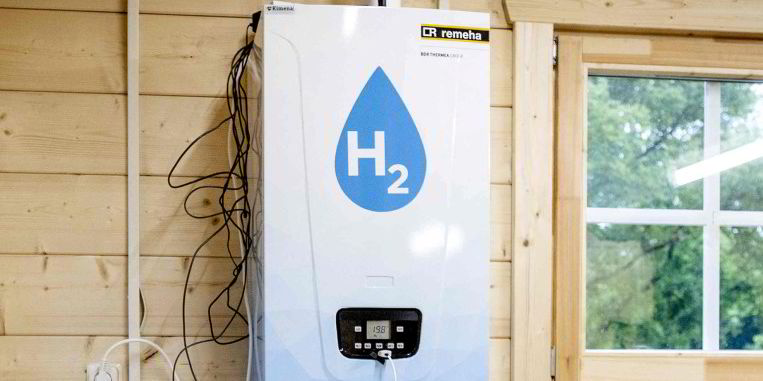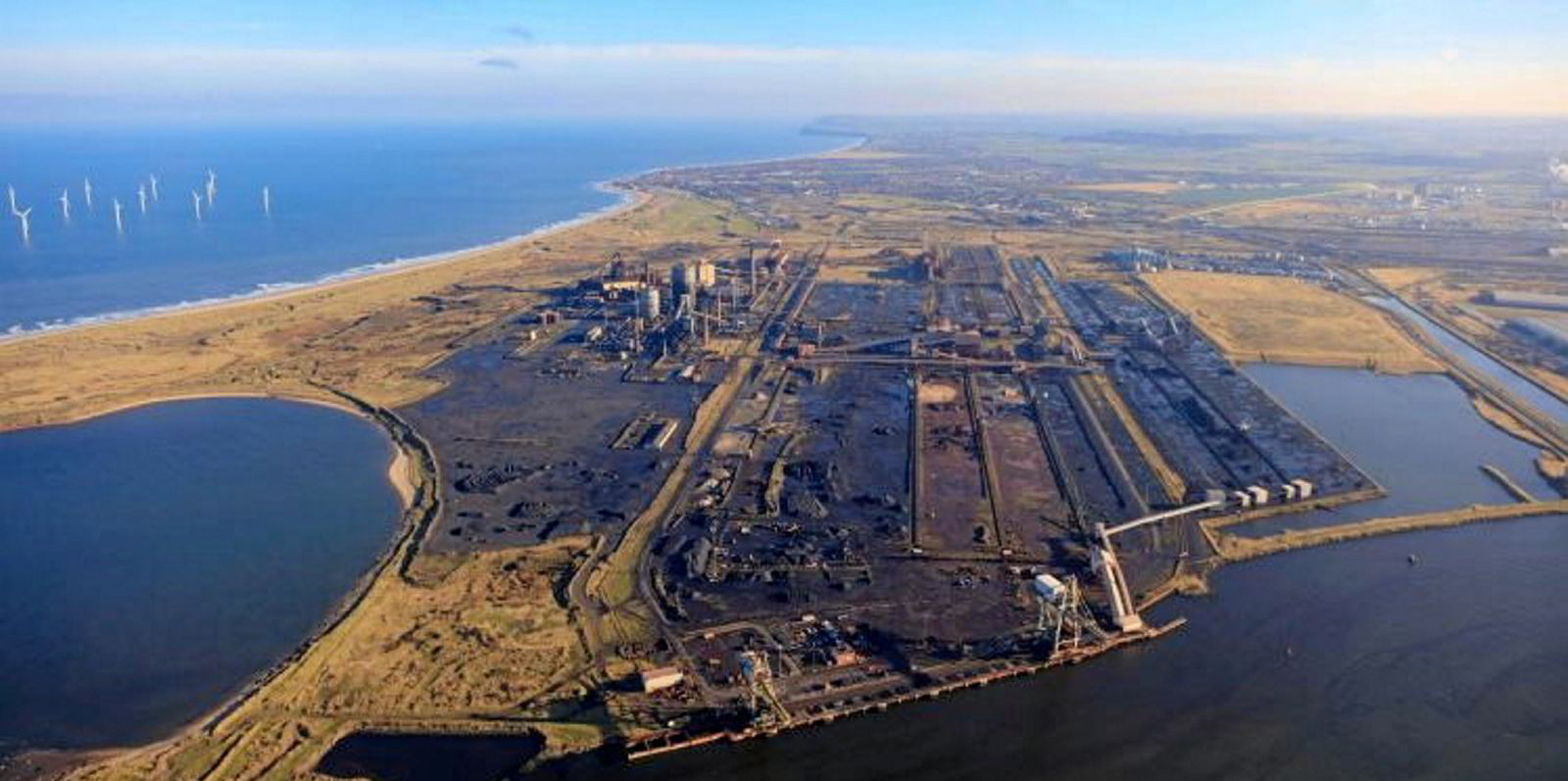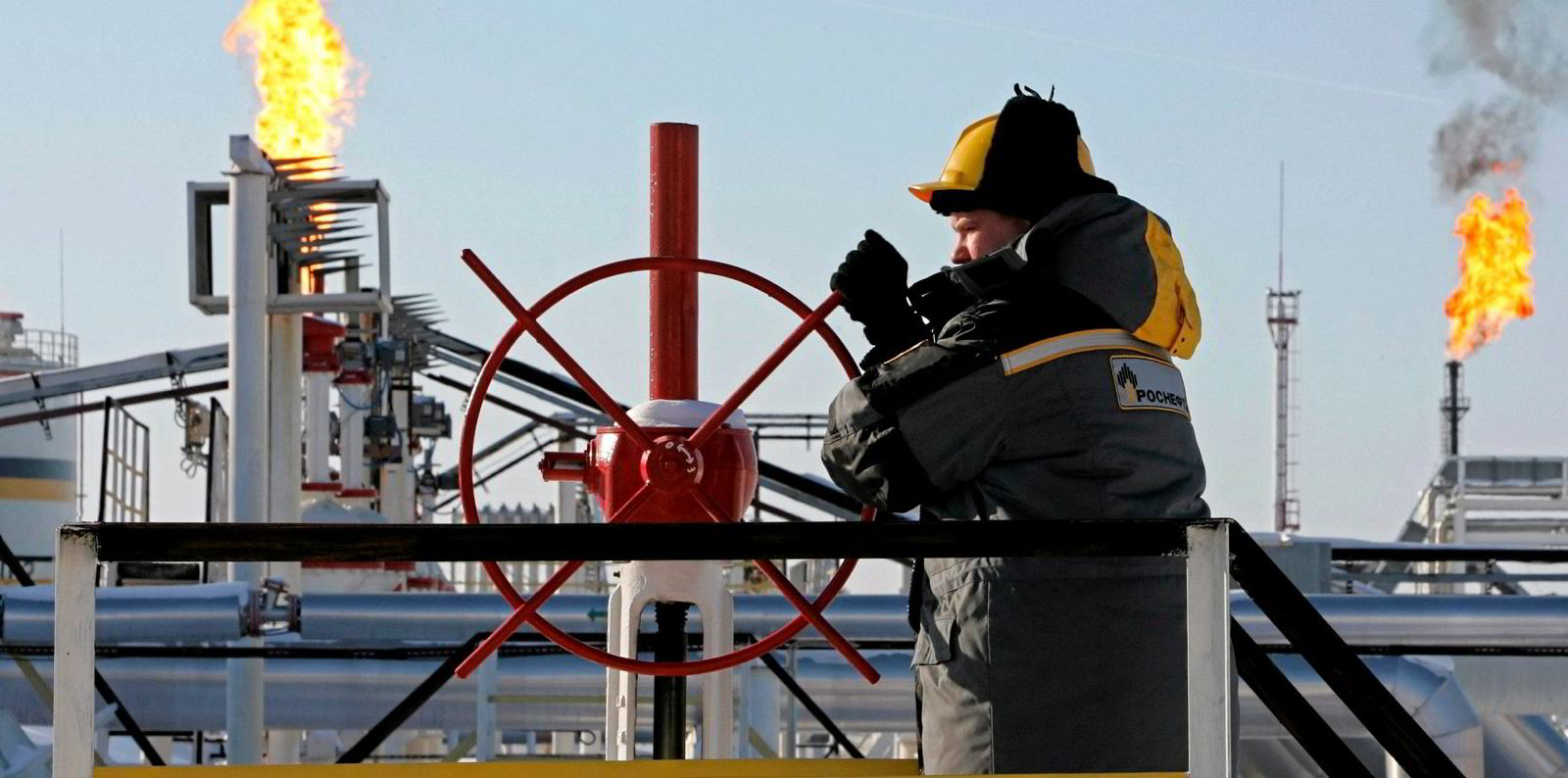BLUE HYDROGEN IS COVER FOR BIG OIL
Industry fires back at 'landmark' study claim that blue hydrogen is worse than natural gasStudy claims blue hydrogen could be dirtier than gas or coal, but critics say researchers used incorrect assumptions to come to incorrect conclusions

Feeling blue: a new peer-reviewed study claims blue hydrogen is worse than for the climate than just burning natural gas
Photo: AFP/SCANPIX
16 August 2021
By Josh Lewis
16 August 2021
By Josh Lewis
UPSTREAM
in Perth
The oil and gas industry is still digesting new research that claims blue hydrogen could potentially be worse for the climate than burning natural gas, although some critics have also hit out at the landmark paper.
The study by researchers at Cornell and Stanford universities was published last week in the Energy Science & Engineering journal and is claimed to be a first-of-a-kind peer-reviewed study of blue hydrogen’s lifecycle greenhouse gases footprint.
The study claims to debunk the notion that blue hydrogen represents an emissions-free, or even low-emissions option, citing the large amounts of natural gas needed to fuel the process itself and the escape of “fugitive methane” from wells and other equipment along the supply chain.
For its default assumptions, which include a 3.5% emission rate of methane from natural gas and a 20-year global warming potential, the study found total carbon dioxide equivalent emissions for blue hydrogen are only 9% to 12% less than for grey hydrogen.
Blue hydrogen is produced from natural gas feedstocks, with the CO2 by-product from hydrogen production captured and stored.
If the UK is to succeed in reaching net zero we will need all the tools in our toolbox. We should applaud the government’s global leadership on clean hydrogen
Equinor executive vice president Al Cook
While admitting carbon dioxide emissions were lower, the study notes fugitive methane emissions for blue hydrogen were higher than grey because of an increased use of natural gas to power the carbon capture technology.
The study claims, under its default assumptions, that the greenhouse gas footprint of blue hydrogen is more than 20% greater than burning natural gas or coal for heat and some 60% greater than burning diesel oil for heat.
Even in a sensitivity analysis in which the methane emission rate from natural gas is reduced to a low value of 1.54%, the study found greenhouse gas emissions from blue hydrogen were still higher than just burning natural gas and only 18% to 25% less than for grey hydrogen.
The study authors note their analysis is a “best-case scenario” for blue hydrogen and assumes captured CO2 can be stored indefinitely, which they claim is “an optimistic and unproven assumption”.
'The results are stark'
"Politicians around the world, from the UK and Canada to Australia and Japan, are placing expensive bets on blue hydrogen as a leading solution in the energy transition,” said study co-author Robert Howarth.

'Act now, you idiots': Australian green groups call for action in wake of IPCC reportRead more
“Our research is the first in a peer-reviewed journal to lay out the significant lifecycle emissions intensity of blue hydrogen. This is a warning signal to governments that the only 'clean' hydrogen they should invest public funds in is truly net-zero, green hydrogen made from wind and solar energy."
The study also comes as the UK prepares to publish its long awaited hydrogen strategy, with blue hydrogen expected to play a role in the UK’s decarbonisation plans.
However, professor of mechanical engineering at the University of Cambridge, David Cebon, warned politicians to take note of the study’s findings before considering investment in blue hydrogen under the premise that it supports the UK’s climate goals.
“This landmark paper sheds light on the key unknown in the UK’s hydrogen debate: the greenhouse gas footprint of blue hydrogen. The calculation method is rigorous, the assumptions are all solid and the results are stark,” he said.
“Blue hydrogen cannot be considered ‘low-carbon’ or a ‘clean’ solution. In fact, this paper shows that producing blue hydrogen is significantly worse than burning fossil fuels for heat, such as gas or coal, in the first place.”
Incorrect assumptions lead to incorrect conclusions
Blue hydrogen and carbon capture and storage is forming a core part of many oil and gas companies energy transition plans as they look to continue to monetise their existing assets in a lower carbon future.
Norwegian giant Equinor is one such player that sees hydrogen playing a key role in the energy transition and is involved in several planned developments, including the proposed Net Carbon Humber development in the UK.
A spokesperson for the company told Upstream that Equinor believes the assumptions used in the study were not correct, which led to incorrect conclusions.

BP signs new agreements to underpin UK blue hydrogen schemeRead more
The spokesperson pointed Upstream towards a letter by Equinor’s executive vice president Al Cook that was published in The Times newspaper in the UK on the weekend.
In the letter Cook states that Equinor “strongly” disagrees with the claim that blue hydrogen made from natural gas could be worse for the environment than simply burning the gas for fuel.
In particular, he highlights claims in the study that — in the US — 2.6% of gas is lost to the atmosphere during production and transportation, causing climate change.
“The figure for the UK’s largest blue hydrogen project, Zero Carbon Humber, is in fact less than one hundredth of this,” he states.
“Zero Carbon Humber will be powered by gas from Norway, produced with some of the lowest emissions in the world. If the UK is to succeed in reaching net zero we will need all the tools in our toolbox. We should applaud the government’s global leadership on clean hydrogen.”
in Perth
The oil and gas industry is still digesting new research that claims blue hydrogen could potentially be worse for the climate than burning natural gas, although some critics have also hit out at the landmark paper.
The study by researchers at Cornell and Stanford universities was published last week in the Energy Science & Engineering journal and is claimed to be a first-of-a-kind peer-reviewed study of blue hydrogen’s lifecycle greenhouse gases footprint.
The study claims to debunk the notion that blue hydrogen represents an emissions-free, or even low-emissions option, citing the large amounts of natural gas needed to fuel the process itself and the escape of “fugitive methane” from wells and other equipment along the supply chain.
For its default assumptions, which include a 3.5% emission rate of methane from natural gas and a 20-year global warming potential, the study found total carbon dioxide equivalent emissions for blue hydrogen are only 9% to 12% less than for grey hydrogen.
Blue hydrogen is produced from natural gas feedstocks, with the CO2 by-product from hydrogen production captured and stored.
If the UK is to succeed in reaching net zero we will need all the tools in our toolbox. We should applaud the government’s global leadership on clean hydrogen
Equinor executive vice president Al Cook
While admitting carbon dioxide emissions were lower, the study notes fugitive methane emissions for blue hydrogen were higher than grey because of an increased use of natural gas to power the carbon capture technology.
The study claims, under its default assumptions, that the greenhouse gas footprint of blue hydrogen is more than 20% greater than burning natural gas or coal for heat and some 60% greater than burning diesel oil for heat.
Even in a sensitivity analysis in which the methane emission rate from natural gas is reduced to a low value of 1.54%, the study found greenhouse gas emissions from blue hydrogen were still higher than just burning natural gas and only 18% to 25% less than for grey hydrogen.
The study authors note their analysis is a “best-case scenario” for blue hydrogen and assumes captured CO2 can be stored indefinitely, which they claim is “an optimistic and unproven assumption”.
'The results are stark'
"Politicians around the world, from the UK and Canada to Australia and Japan, are placing expensive bets on blue hydrogen as a leading solution in the energy transition,” said study co-author Robert Howarth.

'Act now, you idiots': Australian green groups call for action in wake of IPCC reportRead more
“Our research is the first in a peer-reviewed journal to lay out the significant lifecycle emissions intensity of blue hydrogen. This is a warning signal to governments that the only 'clean' hydrogen they should invest public funds in is truly net-zero, green hydrogen made from wind and solar energy."
The study also comes as the UK prepares to publish its long awaited hydrogen strategy, with blue hydrogen expected to play a role in the UK’s decarbonisation plans.
However, professor of mechanical engineering at the University of Cambridge, David Cebon, warned politicians to take note of the study’s findings before considering investment in blue hydrogen under the premise that it supports the UK’s climate goals.
“This landmark paper sheds light on the key unknown in the UK’s hydrogen debate: the greenhouse gas footprint of blue hydrogen. The calculation method is rigorous, the assumptions are all solid and the results are stark,” he said.
“Blue hydrogen cannot be considered ‘low-carbon’ or a ‘clean’ solution. In fact, this paper shows that producing blue hydrogen is significantly worse than burning fossil fuels for heat, such as gas or coal, in the first place.”
Incorrect assumptions lead to incorrect conclusions
Blue hydrogen and carbon capture and storage is forming a core part of many oil and gas companies energy transition plans as they look to continue to monetise their existing assets in a lower carbon future.
Norwegian giant Equinor is one such player that sees hydrogen playing a key role in the energy transition and is involved in several planned developments, including the proposed Net Carbon Humber development in the UK.
A spokesperson for the company told Upstream that Equinor believes the assumptions used in the study were not correct, which led to incorrect conclusions.

BP signs new agreements to underpin UK blue hydrogen schemeRead more
The spokesperson pointed Upstream towards a letter by Equinor’s executive vice president Al Cook that was published in The Times newspaper in the UK on the weekend.
In the letter Cook states that Equinor “strongly” disagrees with the claim that blue hydrogen made from natural gas could be worse for the environment than simply burning the gas for fuel.
In particular, he highlights claims in the study that — in the US — 2.6% of gas is lost to the atmosphere during production and transportation, causing climate change.
“The figure for the UK’s largest blue hydrogen project, Zero Carbon Humber, is in fact less than one hundredth of this,” he states.
“Zero Carbon Humber will be powered by gas from Norway, produced with some of the lowest emissions in the world. If the UK is to succeed in reaching net zero we will need all the tools in our toolbox. We should applaud the government’s global leadership on clean hydrogen.”
Blue hydrogen has transitional role
Meanwhile, Upstream was told by a spokesperson for the Hydrogen Council — a chief executive-led coalition of companies around the world — that it is still reviewing the research paper and its methodology.
“Bringing together 120-plus members from across a multitude of sectors, the Hydrogen Council believes that hydrogen technologies have a key role to play in delivering on global net zero goals,” the spokesperson added.
A spokesperson for independent UK advisory the Climate Change Committee (CCC) also told Upstream it had yet to review the details of the report.
However, head of carbon budgets at the CCC, David Joffe, took to twitter last week to hit out at the study, which he claimed represented a case where blue hydrogen “is done really badly and without any sensible regulations”.

Oil and gas emissions could risk 'killing concept of blue hydrogen', warns Equinor vice presidentRead more
He also highlighted that zero emission green hydrogen, made using electrolysis powered by renewable energy, would take time, with blue hydrogen able to fill in as a “transitional option” to help grow hydrogen, while reducing emissions.
“If we don’t do that, H2 will be less able to contribute to net zero in the areas where it is important as we won’t have given the demand side time to develop,” Joffe said via Twitter.
Officially, the CCC assumes a 95% CO2 capture rate on blue hydrogen production, which is consistent with what large engineering companies, such as Equinor, say is possible, using autothermal reforming technology.
The CCC’s own analysis finds that blue hydrogen could save up to 85% of emissions compared to unabated use of fossil gas, depending on the emissions footprint of fossil gas production being relatively low.
However, the CCC also only recommends hydrogen use be focused in those areas that cannot feasibly be fully decarbonised through other means, such as electrification, because the emissions reduction from blue hydrogen are still “significantly below 100%".(Copyright)
Meanwhile, Upstream was told by a spokesperson for the Hydrogen Council — a chief executive-led coalition of companies around the world — that it is still reviewing the research paper and its methodology.
“Bringing together 120-plus members from across a multitude of sectors, the Hydrogen Council believes that hydrogen technologies have a key role to play in delivering on global net zero goals,” the spokesperson added.
A spokesperson for independent UK advisory the Climate Change Committee (CCC) also told Upstream it had yet to review the details of the report.
However, head of carbon budgets at the CCC, David Joffe, took to twitter last week to hit out at the study, which he claimed represented a case where blue hydrogen “is done really badly and without any sensible regulations”.

Oil and gas emissions could risk 'killing concept of blue hydrogen', warns Equinor vice presidentRead more
He also highlighted that zero emission green hydrogen, made using electrolysis powered by renewable energy, would take time, with blue hydrogen able to fill in as a “transitional option” to help grow hydrogen, while reducing emissions.
“If we don’t do that, H2 will be less able to contribute to net zero in the areas where it is important as we won’t have given the demand side time to develop,” Joffe said via Twitter.
Officially, the CCC assumes a 95% CO2 capture rate on blue hydrogen production, which is consistent with what large engineering companies, such as Equinor, say is possible, using autothermal reforming technology.
The CCC’s own analysis finds that blue hydrogen could save up to 85% of emissions compared to unabated use of fossil gas, depending on the emissions footprint of fossil gas production being relatively low.
However, the CCC also only recommends hydrogen use be focused in those areas that cannot feasibly be fully decarbonised through other means, such as electrification, because the emissions reduction from blue hydrogen are still “significantly below 100%".(Copyright)
No comments:
Post a Comment